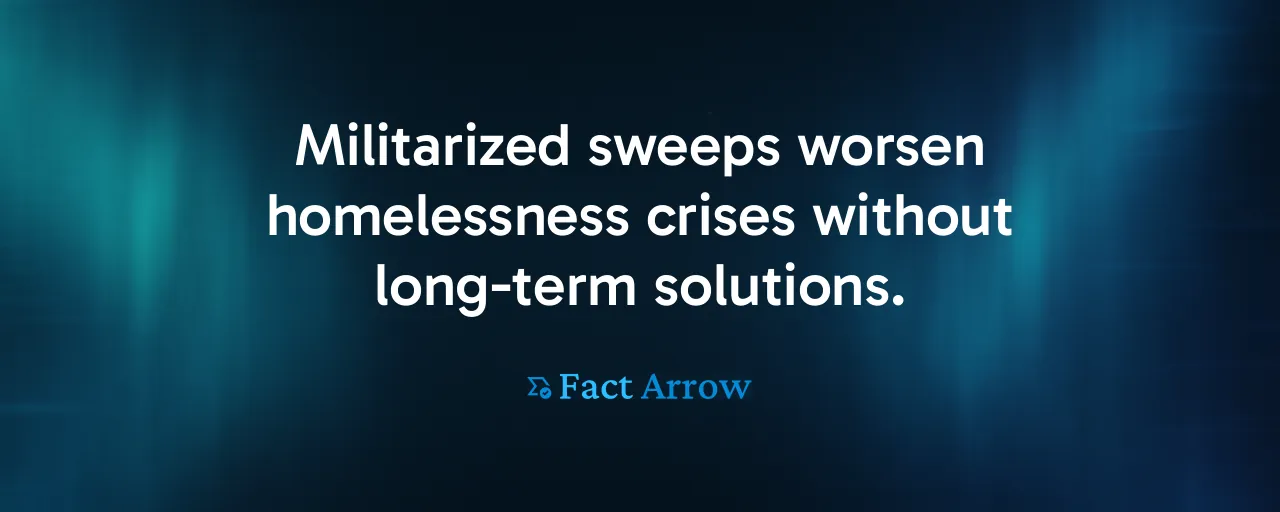A Shocking Scene in MacArthur Park
On July 7, 2025, federal agents stormed MacArthur Park in Los Angeles, rifles drawn, ordering St. John's Community Health workers to halt their medical outreach to homeless residents. The raid, aimed at immigration enforcement, scattered vulnerable patients and left clinicians shaken. Viral footage of the incident ignited national outrage, shining a spotlight on the clash between heavy-handed tactics and humanitarian efforts in one of America's most troubled public spaces.
The operation exposed a deeper tension: how to balance public safety with the urgent need to care for the 75,500 unhoused people in Los Angeles County. Policies that prioritize dignity, health, and stability for the most marginalized offer a better path than militarized sweeps.
The Human Cost of Militarized Tactics
When armed agents interrupted St. John's street-medicine team, they stopped a clinic session and traumatized people already living on the edge. Many of the park's unhoused residents, including immigrants, now fear seeking care, worried that clinics could become traps. This chilling effect compounds an already dire health crisis, where untreated conditions like diabetes or infections often land patients in costly emergency rooms.
Research confirms this. A 2023 study found that police-led sweeps in Los Angeles increase arrests among the unhoused by 31% without boosting housing placements. These operations displace people, scatter belongings, and erode trust in service providers. For a city grappling with a homelessness epidemic, such tactics are a step backward.
Why Sweeps Don't Solve Homelessness
The logic behind park raids often hinges on clearing encampments to restore public spaces. Data, however, tells a different story. Sweeps cost taxpayers an average of $2,600 per person displaced, yet fewer than 10% of those moved end up in stable housing. The 2021 Echo Park cleanup, which removed 180 tents, briefly reopened the park but left most residents back on the streets, cycling through temporary shelters or new camps.
Los Angeles has tried enforcement before, with little success. Historical efforts, like the 2016 Project HOPE outreach paired with LAPD, aimed to bridge policing and services but struggled to build trust. The evidence is clear: displacement without permanent solutions only perpetuates the crisis.
A Better Way: Housing and Care First
There's a proven alternative. Housing First programs, which provide permanent supportive housing with wraparound services, show an 88% retention rate after one year. These initiatives address root causes, offering stability that prevents people from returning to the streets. Scaling up rapid rehousing and Section 8 vouchers could transform lives, improving park aesthetics as a result.
Street-medicine teams like St. John's are critical. Their 14 mobile units deliver care where people are, building trust and reducing emergency costs. Expanding their budgets and protecting their work from interference ensures uninterrupted access to health services, especially for undocumented patients wary of federal agents.
Safeguarding Sanctuary and Services
Los Angeles, a sanctuary city, has a duty to protect its residents from overreach. Codifying parks and clinics as immigration-safe zones during outreach hours would prevent raids from disrupting care. This aligns with California's sanctuary laws, like SB 54, which limit federal immigration enforcement in sensitive areas. Such measures prioritize medical neutrality and community trust while still allowing for lawful arrests.
Innovative programs offer a blueprint. The CIRCLE pilot, using non-police crisis teams, has cut low-level arrests and connected people to services. Expanding this model citywide, with federal funding tied to measurable outcomes, could reduce tensions while addressing public safety concerns.
Bridging Safety and Compassion
Public spaces belong to everyone, and residents deserve parks free of crime and chaos. Safety is best achieved through comprehensive strategies, not solely from rifles or evictions. Multidisciplinary teams, like LAPD's HOPE units, pair officers with outreach workers, though they need better training to avoid mistrust. Joint protocols between federal agents and clinicians could ensure medical work continues uninterrupted, with clear channels for de-escalation.
Compromise is possible. Designated safe-sleeping sites, paired with expedited asylum processing, could reduce encampments while respecting rights. Transparent reviews after incidents like the MacArthur raid would hold agencies accountable and rebuild public confidence.
A Moral and Practical Imperative
The MacArthur Park raid laid bare a broken approach. Armed operations that scare away patients and disrupt care deepen suffering and division, rather than solving homelessness or immigration challenges.
Los Angeles, and cities like it, need policies that treat people with dignity and avoid fostering suspicion.
Investing in housing, expanding street medicine, and protecting sanctuary principles offer a path to lasting change. These solutions cost less than endless sweeps and save lives by addressing root causes. The evidence is undeniable, and the stakes are too high to ignore.
Every person in MacArthur Park deserves a chance at stability and health. It's time to move beyond raids and toward a future where compassion and pragmatism guide the way. The city's unhoused residents, and the workers serving them, demand nothing less.
